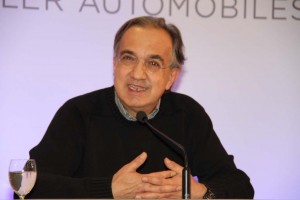
FCA Chief Sergio Marchionne said the company won't seek subsidies from the Canadian government to upgrade its plants in Brampton and Windsor, Ontario.
Fiat Chrysler Automobiles, the parent of the Chrysler Group, has decided to continue building minivans in Windsor, Ontario despite failing to win the subsidies it had hoped for from the Canadian government.
The maker had warned that it might pull out of both the Windsor plant and another factory in Brampton, Ontario due to the high cost of manufacturing in Canada. But the dispute became “a political football,” said FCA CEO Sergio Marchionne during an appearance at the Geneva Motor Show. Despite his frustrations with the lack of government support, Marchionne decided to continue to two operations.
Instead, the company will finance the $3.6 billion project that is expected to produce a new minivan and upgrade the FCA rear-wheel-drive platform produced at the Brampton plant out of its own corporate treasury.
“Our commitment to Canada remains strong,” said Marchionne, who was born in Italy but spent most of his youth growing up in Toronto and Windsor.
The maker pulled the requests because the politics involved weren’t worth the end result, said Marchionne.
“It is clear to us that our projects are now being used as a political football, a process that, in our view, apart from being unnecessary and ill-advised, will ultimately not be to the benefit of Chrysler,” Marchionne said during a Geneva meeting with reporters.
In a subsequent news release, the executive said that, “As a result, Chrysler will deal in an unfettered fashion with its strategic alternatives regarding product development and allocation, and will fund out of its own resources whatever capital requirements the Canadian operations require.”
FCA said it plans to begin to allocate to our Windsor, Ontario, plant the development and industrialization of the next “people carrier” architecture (the so-called next minivan and derivatives).
It has also confirmed that the Brampton facility will benefit from the substantial product updates planned for the large rear-drive platform used for models such as the Chrysler 300, the Dodge Charger and Challenger. Some of these changes could be in the market as early as the second half of 2014.
(Peugeot 308 wins European Car of the Year. For more, Click Here.)
“We have been active participants of the Canadian economy for nearly 90 years, both as a manufacturer and as a seller of cars, trucks and vans,” said Marchionne, who request for financial assistance for Chrysler had led to a political row in Canada.
(Click Here for the details on the new Lamborghini Huracan at Geneva.)
“It is my sincere hope that all stakeholders involved commit to do what they can to preserve the competitiveness of the country, and in particular of the province of Ontario. We will do what we can to preserve and nurture the competitiveness of our operations, but we reserve the right, as is true for all global manufacturers, to reassess our position as conditions change.
(To see how small is big with the new Jeep Renegade, Click Here.)
“On a personal note, as a Canadian, I regret my failure in having been unable to convey the highly competitive nature of markets that offer manufacturing opportunities to carmakers that operate on a global scale,” Marchionne said.
“Some of the shots across the bow following our initial approaches to the Federal and Provincial governments reveal, apart from political convenience, a somewhat restricted view of Canada as an industrial player in what has become a borderless economy. It is clear that we, at Chrysler, need to do more to explain ourselves and our choices going forward.”

Canada isn’t as easily blackmailed as some U.S. entities.